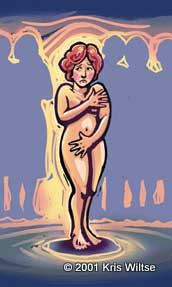The summer after I finished fifth grade, Dad retired from the Air Force. After 20 years in the military, he rose only to the rank of staff sergeant, so there was little retirement pay. Dad’s skills in repairing flight simulators weren’t in great demand in the Real World, so he decided to go to college on the G.I. Bill. The college he chose was Washington State University in Pullman–a 5-1/2 hour drive away from our home.
With Dad away at college and no one earning money, Mom had to apply for public assistance. Now, my mother was no stranger to need. She survived World War II in Germany on rations such as one egg per person per month. But during the war, everyone was in the same boat. While Dad was at college, we couldn’t help comparing our poverty to what we perceived to be the riches of everyone around us. Initially, we received USDA commodities, including cans of chicken, milk in plastic bags, and one-pound bricks of butter. We consumed them in our own home, so it was easy to hide our need, but moving on to food stamps “outed” us. Handing food stamps to the cashier at the grocery store was so humiliating for my mother that she burst into tears.
We were also outed at school, where the three of us kids got free lunches. In the cafeteria of my junior high school, a bulletin board depicted a big construction paper fish eating a smaller fish, which was eating a still smaller fish. Underneath were the words, “There’s no such thing as a free lunch,” which only compounded my shame and self-consciousness.
At 12 and 13, my brother and I started delivering newspapers to earn money. Seven days a week, rain or shine, we traveled miles to deliver The News Tribune to the residents of our rural town, Roy, Washington. The town is bisected by railroad tracks, and Tom delivered papers on one side of the tracks, while I delivered them on the other. Mom got a physically demanding job at a tree nursery called Silvaseed.
Although my father eventually graduated from WSU, things never got much better. He worked here and there as a substitute teacher, but was never able to function outside the military. It had told him what to wear, where to go, what to do, when to do it, how to do it, and whom to salute. He couldn’t figure those things out for himself as a civilian. Socially and emotionally, he remained stuck in his early teens.
When I moved on to work-study jobs in high school, my little sister inherited my paper route. I attended Pierce College, and managed to get through on grants, scholarships, and more work-study jobs. Then I transferred to Seattle Pacific University, where I also received grants, student loans, and work-study.
I don’t know if it was not being able to afford a 10 cent postage stamp or a 25 cent load of laundry, but I eventually had one of those Scarlett O’Hara moments. You know, the moment when she collapses on her knees, grabs a fistfull of dirt and says, “As God is my witness, I’ll never be hungry again.”
And that is exactly how my life turned out.
Not having enough money made me feel desperate, stressed, embarrassed, trapped, powerless, and afraid–all definite signs that I was not on my path. When I graduated from college and was able to assume full responsibility for my own destiny, I redirected my course, and things got a lot better.
Kris Wiltse’s illustrations for the “Desperate,” “Stressed,” “Embarrassed,” “Trapped,” “Powerless,” and “Afraid” cards from the Mixed Emotions card deck.






